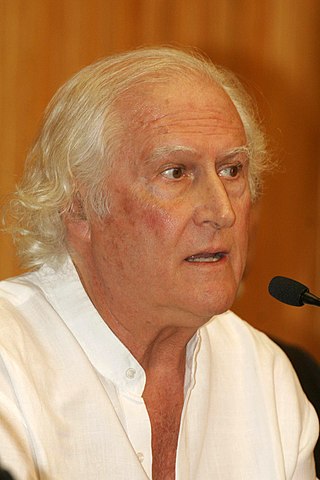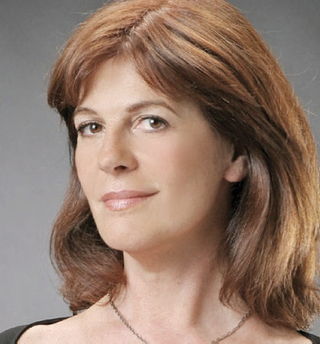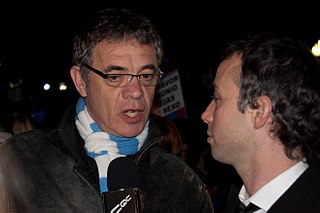
Jorge Marrale (born June 30, 1947) is an Argentine actor.

Jorge Marrale (born June 30, 1947) is an Argentine actor.
Marrale was born in Buenos Aires' industrial Barracas section to a Spanish mother and an Italian father (from the Calabria Region), in 1947. His paternal grandfather had been an actor in Italy, and instilled an interest in the art on the young Jorge, as did a performance by Italian silver screen legend Vittorio Gassman.
He had enrolled in the Dramatic Arts Conservatory by 1970 and, shortly afterwards, was accepted into the National Comedy at the prestigious Cervantes Theatre. His first role in the theatre was in Tadeusz Różewicz' White Wedding, and he soon received roles in local productions of Fyodor Dostoyevsky's White Nights and William Shakespeare's Midsummer Night's Dream , among others. [1]
Marrale was first cast in the cinema by director Alejandro Doria for Aída Bortnik's Contragolpe (Retribution), in 1979. He later took part in a public television production of Romeo and Juliet and in a Channel 9 production of Les Miserables (both in 1981). Alejandro Doria brought Marrale back for his 1984 drama, Darse cuenta (Realization) and he was given the lead male role by Beda Docampo Feijóo for her moody, 1988 Los amores de Kafka (Loves of Kafka). Docampo Feijóo also cast Marrale in her 1992 adaptation of Dostoyevsky's The Eternal Husband . [2] Marrale also played the role of a shepherd in Spanish film director Carlos Saura's TV film El Sur , which is based on the short story El Sur by Argentine author Jorge Luis Borges. [3]
He continued to perform regularly in the theatre, working with renowned Argentine playwrights Roberto Cossa and Pacho O'Donnell, among others. He has also garnered extensive television credits since his 1981 debut, cast in numerous roles in diverse genres as biopics, docudramas and telenovelas - mostly on Channel 9 and Telefe. [4] Among the most notable was his role in Doria's production of Julio Cortázar's La salud de los enfermos (The Health of the Sick), in 1996.
That year, Marrale starred in an Eduardo Raspo's film noir, Geisha, as an heir involved in a probate dispute with an enigmatic young woman. He played the dubious father of a recently deceased lover of a nemesis of his in Marcelo Piñeyro's Cenizas del paraíso (Ashes from Heaven, 1997) and populist former President Juan Perón in Héctor Olivera's look at Perón's controversial brother-in-law Juan Duarte, Ay Juancito (2004), among numerous leading roles. [2]
Marrale was reunited with director Alejandro Doria for his biopic on the embattled Father Mario Pantaleo (whom Marrale portrayed) in Las manos (The Hands), in 2006. The prolific actor has received numerous prizes for his work in cinema, television and theatre, continuing to be among the most active Argentine actors in all three media. He also teaches and, with Osvaldo Santoro, directs the Beckett Theatre in Buenos Aires. [5]

Fernando Ezequiel "Pino" Solanas was an Argentine film director, screenwriter, score composer and politician. His films include; La hora de los hornos (1968), Tangos: el exilio de Gardel (1985), Sur (1988), El viaje (1992), La nube (1998) and Memoria del saqueo (2004), among many others. He was National Senator representing the Autonomous City of Buenos Aires for six years, from 2013 to 2019.

Cinema of Argentina refers to the film industry based in Argentina. The Argentine cinema comprises the art of film and creative movies made within the nation of Argentina or by Argentine filmmakers abroad.

Los Amores de Kafka is a 1988 Argentine romantic biographical film directed by Beda Docampo Feijóo and written by Juan Bautista Stagnaro. Starring Cecilia Roth.

Laura Ana "Tita" Merello was an Argentine film actress, tango dancer and singer of the Golden Age of Argentine Cinema (1940–1960). In her six decades in Argentine entertainment, at the time of her death, she had filmed over thirty movies, premiered twenty plays, had nine television appearances, completed three radio series and had had countless appearances in print media. She was one of the singers who emerged in the 1920s along with Azucena Maizani, Libertad Lamarque, Ada Falcón, and Rosita Quiroga, who created the female voices of tango. She was primarily remembered for the songs "Se dice de mí" and "La milonga y yo".

Nazareno Casero is an Argentine film and television actor. He works in the cinema of Argentina.

Susana Raquel "Susú" Pecoraro is an Argentine film and television actress, one of the most popular of the country.

Lito Cruz was a prominent Argentine stage director and motion picture actor.

José Carlos "Pepe" Soriano was an Argentine actor, director, and playwright.
The Hands is a 2006 Argentine-Italian drama film directed by Alejandro Doria. The plot was inspired by the life and work of Catholic priest Mario Pantaleo. Doria and Juan Bautista Stagnaro wrote the screenplay. The film won one Goya Award.
Antonio Gasalla is an Argentine actor, comedian, and theatre director.

Duilio Marzio was a well-known Argentine cinema and theatre actor.
Hugo Soto was an Argentine actor and artist.

Ricardo Luis Amigorena, better known as Mike Amigorena is an Argentine actor.
Inda Ledesma was an Argentine stage, television, and cinema actress who also gained prominence as a theatre director and instructor.

Luisa Vehil was an Uruguayan theater and movie actress who had a notable career in Argentina. She was an iconic figure in the Argentine theatre scene.

Jean Pierre Noher is a French-born Argentine actor.
Mario Pasik is an Argentine actor. He is most known for TV series Son de Fierro (2007), Endless Summer (1998) and Champs 12 (2009).

Francis: Pray for me is a 2015 Argentine film, starring Darío Grandinetti as Pope Francis. The film is based on the 2013 book, Pope Francis: Life and Revolution, which was written by Francis' close friend Elisabetta Piqué who is also a correspondent for the Argentine newspaper, La Nación in Italy and the Vatican since 1999. The film was released as Papa Francisco: The Pope Francis Story in the Philippines.

Chela Ruiz was an Argentine actress. Her career spanned radio, film, television and stage, and in 1997 the Argentine Association of Actors awarded her the prestigious Premio Podestá for her theatrical work.
Diego Alonso Gómez is an Argentine actor, mostly known for his roles in telenovelas. He rose to fame for his starring role as Sergio "El Pollo" in the 2000 Canal 7 series Okupas.